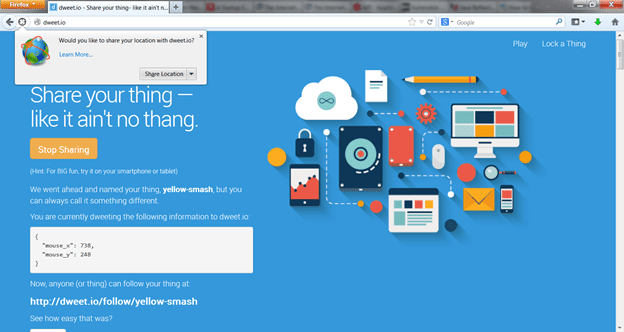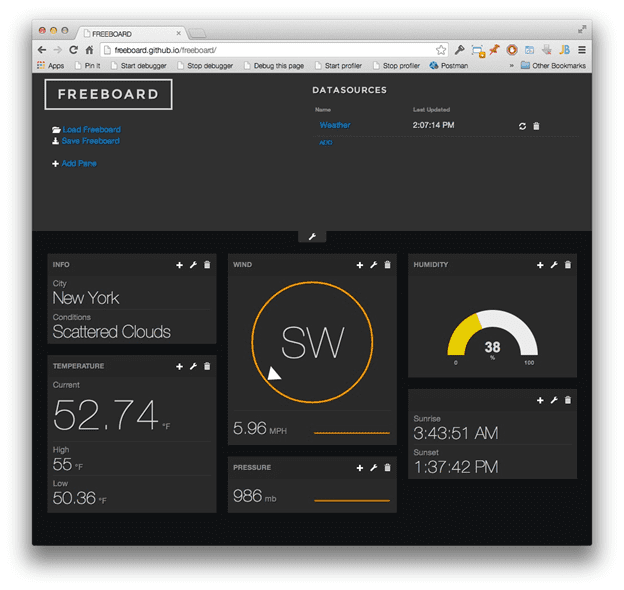NEW YORK—A New York City company is trying to make the Internet of Things simpler by developing an app that publishes data with the click of a button.
Bug Labs, which specifically assists companies in the field of the Internet of Things (IoT), has created Freeboard, an app which people can use to publish data from a particular “smart” thing to its own public web page. Bug Labs refers to this process as “dweeting.”
Freeboard draws upon dweet.io, a simple and free way to share device data online. Here’s what this product looks like when activated:

Notice that the product is transmitting my cursor’s position, that I can dweet my location (latitude and longitude) if I choose to do so, and that others can follow my dweets.
Freeboard seeks to build upon dweet.io by building interactive interfaces and consoles that link several devices together. When completed, an example Freeboard might look something like this:

While it is not the most sophisticated of IoT apps, Freeboard is presumably one of the easiest to use in that it could make linking things and publishing data as simple as putting a file into DropBox. This stands in contrast to some other apps, such as OpenRemote, which some have cautioned might be too difficult for users with no programming experience to set up.
Though companies such as Bug Labs may succeed in making the Internet of Things easier, these advancements might not necessarily enhance IoT security. As Allan Pratt, an InfoSecurity and CyberSecurity strategist, noted in an article a month ago on this website, the Internet of Things can be dangerous if companies who are creating these apps do not have a sufficient grasp of security protocols with regards to the devices they are adding to their networks. This lack of knowledge could leave some IoT apps vulnerable to hackers.
Pratt’s point illustrates an important facet of the Internet of Things: greater focus must be paid to protecting the Application Programming Interfaces (APIs) across which one’s information is delivered.
In networks, APIs function as entry points into libraries that facilitate data and communication protocols. Unfortunately, these can be exploited by attackers: if the APIs are improperly secured, hackers can trick them into revealing customer data.
It is a good thing that companies are making the Internet of Things easier for people to engage. But challenges remain. Going forward, companies in the business of IoT must protect the apps and APIs which store and share people’s information.
David Bisson | @DMBisson
 Bio: David is currently a senior at Bard College, where he is studying Political Studies and writing his senior thesis on cyberwar and cross-domain escalation. He also works at the Hannah Arendt Center for Politics and Humanities at Bard College as an Outreach intern. Post-graduation, David would like to leverage his extensive journalism experience as well as his interest in computer coding and social media to pursue a career in cyber security, both its practice and policy
Bio: David is currently a senior at Bard College, where he is studying Political Studies and writing his senior thesis on cyberwar and cross-domain escalation. He also works at the Hannah Arendt Center for Politics and Humanities at Bard College as an Outreach intern. Post-graduation, David would like to leverage his extensive journalism experience as well as his interest in computer coding and social media to pursue a career in cyber security, both its practice and policy






